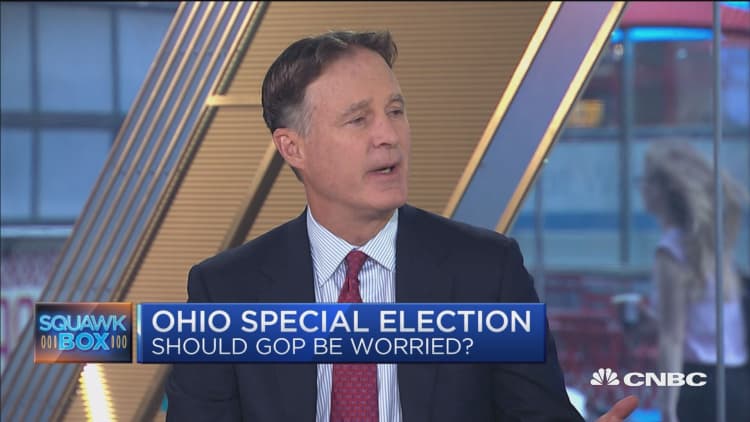Three months out, President Trump and his Republican Party face grim prospects in midterm elections — with good reasons to fear they'll get grimmer.
Strategists in both parties now consider Democrats likely to gain the 23 seats they need to reclaim a majority in the House of Representatives. That would let Democrats roadblock Trump's legislative agenda, launch oversight investigations and explore impeachment proceedings.
The Senate outlook remains in greater doubt as the parties wage even-money battles in eight states, most of them Trump-friendly. But no one dismisses Democrats' opportunity to gain the two seats they need for control, which would give them veto power over White House appointments to the Cabinet and courts.

The challenge for Republicans starts with history. Midterm elections have always given voice to Americans' discontent with incumbent presidents, which means the opposition party almost invariably gains ground.
The challenge deepens with the unique contours of Trump's presidency. The 54 percent of Americans who disapprove of his job performance in this week's Gallup poll exceeds the disapproval at a similar point for any of the previous six presidents, beginning with Jimmy Carter.
Moreover, Trump has reshaped the GOP in ways that leave the party dependent on greater support from a shrinking segment of the population. As America grows more diverse and better-educated, the Gallup survey showed that whites without college degrees now represent a large majority of those who call themselves Republicans.
Vulnerable candidates
Extraordinary support from those non-college whites is what keeps Trump's national approval from falling below 40 percent. They approve of his job performance by 58 percent to 39 percent while, among all other Americans, 29 percent approve and 66 percent disapprove.
That leaves Republican candidates vulnerable in House districts with above-average numbers of college graduates or non-whites or both. Those include at least half of the 65 seats that David Wasserman of the Cook Political Report has identified as linchpins of the House campaign.
One of them, Ohio's 12th District near Columbus, holds a special election today to replace a nine-term House Republican who retired early. Though GOP nominees carried the seat by double-digit margins in the last two presidential contests, pre-election polls show Democrat Danny O'Connor even with Republican Troy Balderson.
Democratic competitiveness in such a Republican-leaning district reflects superior enthusiasm among Trump's partisan adversaries. Nationally, the House polling average calculated by FiveThirtyEight.com shows voters favoring Democrats over Republicans by roughly 8 percentage points, 47.7 percent to 39.9 percent.
The recent history of lopsided midterm contests suggests that such advantages grow and solidify as the election approaches. In 2006, when Democrats won back the House, and in 2010, when Republicans did, the numbers of majority-party seats rated highly vulnerable by the Cook Report more than doubled between July and November.
The economic fallout of Trump's trade tariffs, which have rattled financial markets and squeezed Trump's farm state allies, represent another source of Republican unease. With government data showing scant wage increases so far for average workers, economic growth and tax-cuts have generated such paltry political momentum that candidates within the reconfigured GOP prefer talking about divisive cultural issues such as immigration and crime.
The ongoing Trump-Russia investigation poses more pre-election danger. Justice Department prosecutors have placed Trump's 2016 campaign chairman Paul Manafort on trial, obtained the cooperation of his former national security adviser Michael Flynn, and seized records from his personal attorney Michael Cohen. What comes next, and when, is not publicly known.
Trump's narrowing defenses
But the president and his aides keep retreating behind ever-narrower defenses – from denying any contacts with Russians, to admitting them but insisting they weren't about Hillary Clinton, to insisting they hadn't colluded with Russia, to saying it wouldn't be illegal if they had. Trump has resisted questioning from special counsel Robert Mueller.
Nervous Republicans can only watch the president vent through his increasingly scattershot Twitter account. Lately he has lashed out at a bewildering array of targets: the Mueller "witch hunt," the "Fake News" media, the "globalist" Koch Brothers, LeBron James, Gov. Jerry Brown of California.
In one tweet this week, he falsely claimed stronger poll ratings than President Obama at a similar point. "We are winning on just about every front," he added, "and for that reasons there will not be a Blue Wave."
"There might be a Red Wave," Trump concluded. No Republican with a political career on the line believes him.


